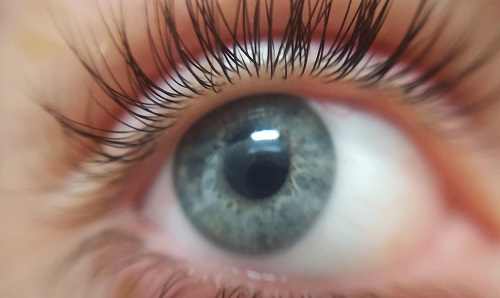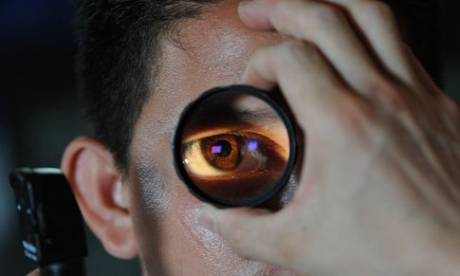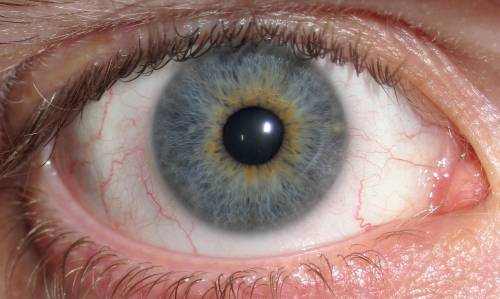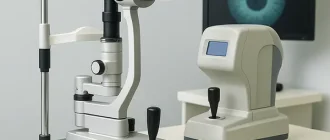Knowing the causes of blindness can and should be taken to prevent this vision problem.
Blindness is a medical term for severe visual impairment or complete lack of vision. With blindness it is impossible or significantly limited visual perception due to significant narrowing of the visual field, as well as decreased central visual acuity.
Types of Blindness
In clinical practice, the following types of this pathology are distinguished:
- Total or absolute blindness.
- Practical blindness.
Total blindness is a condition in which the visual sensation of both eyes is completely absent. In practical blindness there is residual vision, color and light perception is preserved.
Read also about Blind Spots
Causes of blindness
The fear of going blind very often induces very anxious people when they go to the doctor to ask rather silly questions, for example: can people go blind in their sleep? At the same time, it is easy for any competent specialist to explain that sudden blindness does not occur in absolutely healthy people. This pathology can be a consequence of such conditions and diseases as:
- Diabetic retinopathy.
- Glaucoma.
- Cataract.
- Degeneration of the visual spot.
- Trachoma.
- Onchocerciasis.
- Keratomalacia xerophthalmia.
- Trauma to the head or eye.
There are also a number of specific varieties of blindness:
Daltonism. This is an abnormality in which a person cannot distinguish colors that others can easily distinguish. The pathology is usually predetermined genetically and is passed down through the male line. According to statistics, it is detected in almost 8% of men, while in women, the figure is less than 1%. Moreover, in most cases, the visual acuity of such patients remains normal.
Chicken blindness. With this pathology, a person loses the ability to distinguish objects in the twilight. This disorder may be genetic or develop as a result of a number of diseases. An overwhelming number of patients with night blindness have normal visual acuity in daylight hours. Therefore, it is difficult to call this phenomenon blindness.
Snow blindness. It is a deterioration or complete absence of visual perception under the powerful influence of UV rays on the vision. Most often, this disorder occurs over time due to overgrowth of the cornea surface tissues. Snow vision loss is a temporary phenomenon and never entails complete blindness. Moving objects, bright lights, outlines of objects, people can see in any case.
Blindness, as a pathology of vision, can be temporary and permanent. In order to determine the degree of impairment, the visual field is measured, as well as visual acuity, separately for each eye. The ability to see can sometimes disappear suddenly or deteriorate slowly (when the cause is a disease), gradually losing it altogether. In any case, it is necessary to visit an ophthalmologist to determine the degree of blindness. It should be remembered that some types of even total blindness are reversible. However, when a patient is diagnosed with optic nerve dysfunction, or when there is a cerebral hemorrhage, it is almost impossible to regain vision.

See also: Blurry Vision
Diagnosis
A person is considered blind if he/she has no visual sensation at all or in the presence of light sensation or residual vision (0.01D – 0.05D), in the eye, capable of seeing with spectacle correction. Blinded people lose the ability to distinguish certain characteristics of objects: light, color, size and shape, and the location of objects. They have serious difficulties with orientation in space (distance, direction, movement, etc.). All this becomes the reason of impoverishment of sensual experience, complicates their movement. At the same time, the blind have a significantly increased reaction to sound, since sounds are a very important factor of orientation in the surrounding world.
Because of blindness there is a delay in movement. Many blind people notice changes of emotional character towards the negative. In the process of getting used to the lack of vision, the person usually overcomes the negative phenomena of the new state, forming other ways of recognizing the surrounding reality with the involvement of the auditory, motor, skin and other analyzers. Now it is these that form the basis for the development of complex mental processes – generalized perception, arbitrary attention, abstract thinking and logical memory. All of this allows the blind to perceive reality correctly. The visual perceptions retained in a blind person’s memory play a significant role in orientation and also in forming figurative thinking.
Read also about Blurry Peripheral Vision
Treatment
Complete blindness as a result of damage to the optic nerve or a stroke is not amenable to treatment. In such cases it is unfortunately impossible to restore sight.
To improve the quality of life of blind patients special tools are designed to facilitate their daily life: books and manuals written in Braille (today there are also electronic versions), computer programs, as well as a number of devices that significantly enhance the abilities of the blind (totally blind and visually impaired).
Sudden blindness is always a severe psychological trauma, which is often accompanied by a prolonged depression. That is why treatment measures should be carried out not only by an ophthalmologist, but also by a psychiatrist.
Modern ophthalmology does not yet have methods for the treatment of congenital color blindness. With its acquired form, it requires elimination of the causes that led to its development. Sometimes, an improvement in vision may occur after withdrawal of a particular drug.
See also: Vision Problems During Pregnancy
How to prevent total blindness
It is possible to prevent blindness with some knowledge and high quality medical care.
Blindness resulting from injuries is prevented by absolute adherence to eye protection instructions. Forms of essential blindness, can be corrected through dietary adjustments. Early detection of cataracts and glaucoma, with regular treatment, can avoid blindness associated with these diseases. Controlling blood sugar levels and maintaining one’s own weight, as well as exercising, quitting smoking and following a certain diet will help avoid blindness due to diabetic retinopathy.
In connection with all of the above problems, the advice should be to spend more time in the fresh air. Due to this, the organ of vision rests, and the body strengthens. This is a very good prevention of all systemic pathologies. You can also try folk methods of care for the eyes, including lotions and drops. At the same time you should carefully monitor your health. At the first symptoms of eye color changes, you should immediately make an appointment with a specialist and have an examination.





